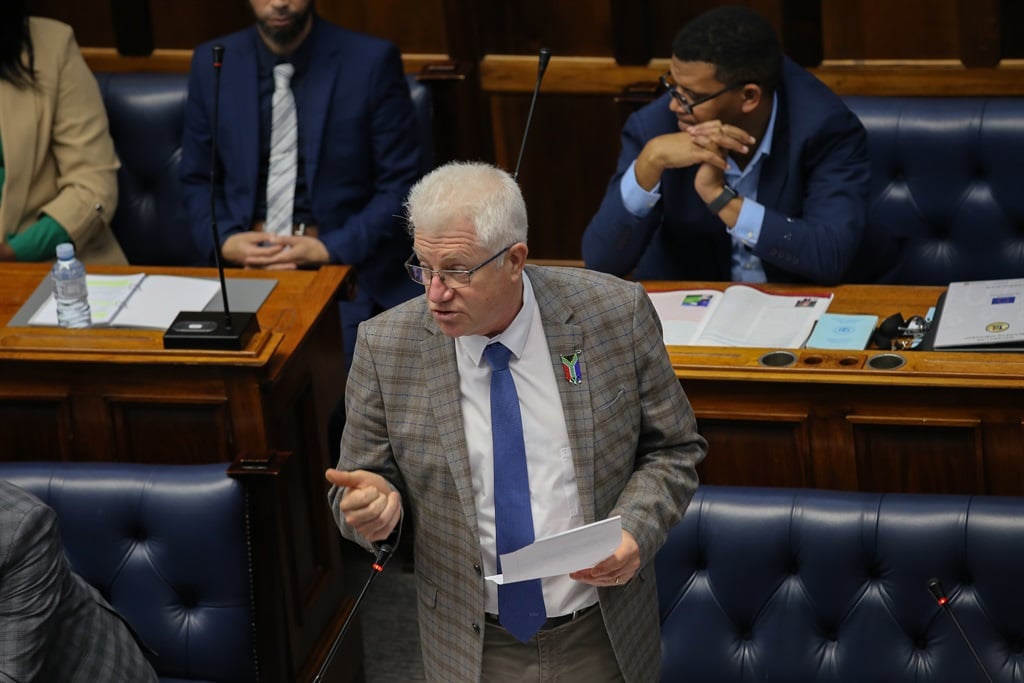Western Cape Premier Alan Winde (Ziyaad Douglas/Gallo Images)
- Opposition parties want Alan Winde to reallocate funds to prevent the loss of 2 400 teaching posts.
- Winde argues the shortfall is due to the national government’s wage agreement.
- In 2019, Winde redirected 1% of the education and health budget to the province’s safety plan.
Opposition parties in the Western Cape are putting pressure on Premier Alan Winde to reprioritise the province’s funding.
They want Winde to invest more money in the Western Cape education department in a bid to prevent the loss of 2 400 teaching posts.
The department has a R3.8 billion shortfall.
Opposition parties argued that, had Winde not taken 1% from the education and health budget in 2019, the department would not be in the position of having to slash 2 400 educator posts.
Winde, however, said the shortfall was due to the national government’s wage agreement, which was not fully funded, and left the province having to cover 36% of the costs.
In 2019, Winde announced that he had redirected 1% of the education and health budget to the province’s safety plan.
READ | Work with us, not against us: Education MEC begs unions not to strike over plan to cut teaching posts
The province’s flagship safety plan aims to halve the murder rate in the Western Cape’s top-10 crime hotspots.
The comprehensive plan deploys police officers, using data from ambulances, emergency admissions, traffic, citizens and neighbourhood watch groups. The premier said a key part in making the safety plan successful was using enhanced technology and data analysis capability.
Winde added that R1.1 billion was reallocated to the plan five years ago, which represented just over 1% of the combined health and education budget.
“The real issue is the lack of sufficient funding from the national government, which has also forced us to cut back on the Rapid School Build Programme, as well as staffing.
“Despite these challenges, we remain committed to ensuring quality education for our learners. Last year, we confronted this crisis in health and had to make similar staffing cuts,” he said.
However, opposition parties said the 1% taken from the budget could have had an impact.
The ANC’s Khalid Sayed said: “The slashing of the education department is absolutely incomprehensible. We have raised this concern about resources being taken away from health and education to fund a non-existent safety plan.
“It’s unacceptable and callous, and shows that teaching and learning, particularly in poor and working-class areas, is not a priority of this Western Cape provincial government. The funds could have been used to cushion the budget, instead of reducing teaching posts.”
GOOD’s Brett Herron said the provincial government had to reprioritise in order to protect the right to education.
He added:
This is by means of combining the budget and making choices between vanity projects and the most basic obligation, like providing adequate education. The funding of access to basic and adequate education has to be protected from raiding for other projects – particularly projects that are not core provincial mandates.
“Had the defunding of education to pay for LEAP (law enforcement advancement programme) not happened, then the Western Cape government would not have had to slash 2 400 educator posts. The department has a shortfall of approximately R560 million for educators – while, this year alone, the Western Cape government is transferring R350 million to the City of Cape Town for LEAP officers,” he said.
The EFF’s Aishah Cassiem said: “This move (the cutting of the teacher posts) by the department does not come as a surprise as, earlier this year, the premier of the Western Cape mentioned that his government would cut the budgets intended for education and health, and then redirect the funds to the so-called safety plan.
“It is then safe to conclude that these latest events were well-planned and well-orchestrated to undermine the education department at the cost of promoting the so-called safety plan, which the premier deems as his brainchild, a venture which has failed at its inception to say the least,” she said.
Winde said the safety plan’s budget was just over a billion and would not cover the education budget’s R3.8 billion shortfall.
